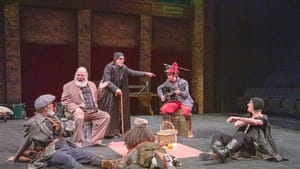Stay in the Loop
BSR publishes on a weekly schedule, with an email newsletter every Wednesday and Thursday morning. There’s no paywall, and subscribing is always free.
The “Extreme Shakespeare” Henriad continues
Pennsylvania Shakespeare Festival presents Henry IV, Part 2

The 2023 season of the Pennsylvania Shakespeare Festival begins with a return, in more ways than one. Henry IV, Part 2 revisits both the historical world of Shakespeare’s Henriad, following a staging of Part 1 in 2019, and PSF’s “Extreme Shakespeare” style, harkening back to the methods of Shakespeare’s original company. Instead of your typical 21st-century rehearsal process, actors arrive with their lines memorized, gather props and costumes from old shows, and stage the play with no director nor designers—all in a matter of days.
If this sounds like a messy, madcap way to mount a show, it’s a style well-suited to one of the messier and more madcap plays in Shakespeare’s canon. Often considered the lesser middle chapter of the Henriad, Henry IV, Part 2 offers a loose collection of comedic episodes against a backdrop of royal unrest.
The king is dying, and rebel forces stir, but the play is less concerned with politics than it is with the tertiary antics of the London underworld, spending more time in taverns than at war. In other words, it’s an ideal setting for the ragtag spirit of Extreme Shakespeare.
Comedians, coquettes, and officers
As such, the play belongs less to King Henry or Prince Hal (Jim Ireland and Eli Lynn, respectively) than it does to Falstaff, Shakespeare’s perennial rogue, brought admirably to life by an ebullient John Ahlin (reprising his role from Part 1). Ahlin’s Falstaff is the fulcrum of the play, hatching plots to profit off his knighthood and evade his outstanding debts. As joyous as he is in spells of punning and physical comedy, Ahlin’s most impressive work reveals itself in the character’s quieter moments: the artful ramblings that stumble into unexpected kernels of wisdom, or occasional musings on old age.
This measured work provides a sturdy foundation for the rest of the company to take wilder comedic swings. Take Mistress Quickly (Kimberly Gilbert) and Doll Tearsheet (Taylor Congdon), for instance, the innkeeper who runs the Boar’s Head Tavern and a sex worker who counts herself among its regular clientele, respectively. Gilbert and Congdon turn on a dime between coquettish croons and volatile tirades, so attuned to the bawdiness of the material that their humor effortlessly bridges the gap between Shakespeare’s time and ours.
Similarly effective are the jittery strides of Justices Shallow (Anthony Lawton) and Silence (Christopher Patrick Mullen), two cloaked officials who wheeze and wheedle their way about the stage, raising troops for Falstaff’s employ. Other highlights include Fang (Ty Lane) and Snare (Sabrina Lynne Sawyer), two sergeants in police-officer blue who fail to arrest Falstaff in spectacular slapstick style, and Bardolph (Patrick Toon), Falstaff’s lumbering red-nosed partner-in-crime.
The downside of no director
While the play revels in its comic episodes, it struggles with some of its more dramatic fare. As young Hal, Lynn cavorts about his future kingdom with a blissfully carefree air—his initial encounter with Falstaff is a particular joy—but falters when it comes time to address his dying father. Ireland’s King Henry IV is largely misguided, stumbling through his dying gasps with ungainly stature. In playing up the character’s illness, he too far strays from the image of nobility to which Hal must ultimately aspire. When father and son finally meet, the crown feels oddly weightless, so their confrontation—in which Henry berates his son for his juvenile antics, and Hal accepts the burden of kingship—fails to resonate.
Part of this can be attributed to flaws in the play’s dramatic structure. It’s an extraordinary challenge to establish the conflict between the Henrys, escalate its stakes, and entirely resolve it in the span of a single scene. Yet still, it seems that the directorial absence which so energized the earlier episodes impeded the company in addressing the play’s thornier elements.
A new king and a new age
It is easy to forgive the play for these dramatic missteps, however, particularly in its final moments, when young Henry, now king, renounces Falstaff in the public square. Lynn and Ahlin wonderfully render what’s possibly one of the cruelest scenes in all Shakespeare, a sobering conclusion to the spirited escapades that preceded it: the inauguration not only of a new king, but a new age.
Time has finally caught up with Falstaff, and old debts must at last be paid; the chimes at midnight toll a final time. It’s a fitting end for both the character and the play, rollicking through their scenes in a series of gambits and near misses, witty until their final heartbreaking moments, in a motley concoction of rough-around-the-edges theater that you wouldn’t want any other way.
What, When, Where
Henry IV, Part 2. By William Shakespeare. Through June 11, 2023, at Pennsylvania Shakespeare Festival’s Labuda Center for the Performing Arts, 2755 Station Avenue, Center Valley. (610) 282-WILL or pashakespeare.org.
Accessibility
The Pennsylvania Shakespeare Festival box office is able to accommodate requests for a wheelchair or companion seat, space for a service animal, a large-print program, or a headset for the assisted listening system. There will be an audio-described performance of Henry IV, Part 2 on Saturday, June 10, at 2pm.
Sign up for our newsletter
All of the week's new articles, all in one place. Sign up for the free weekly BSR newsletters, and don't miss a conversation.

 Kiran Pandey
Kiran Pandey